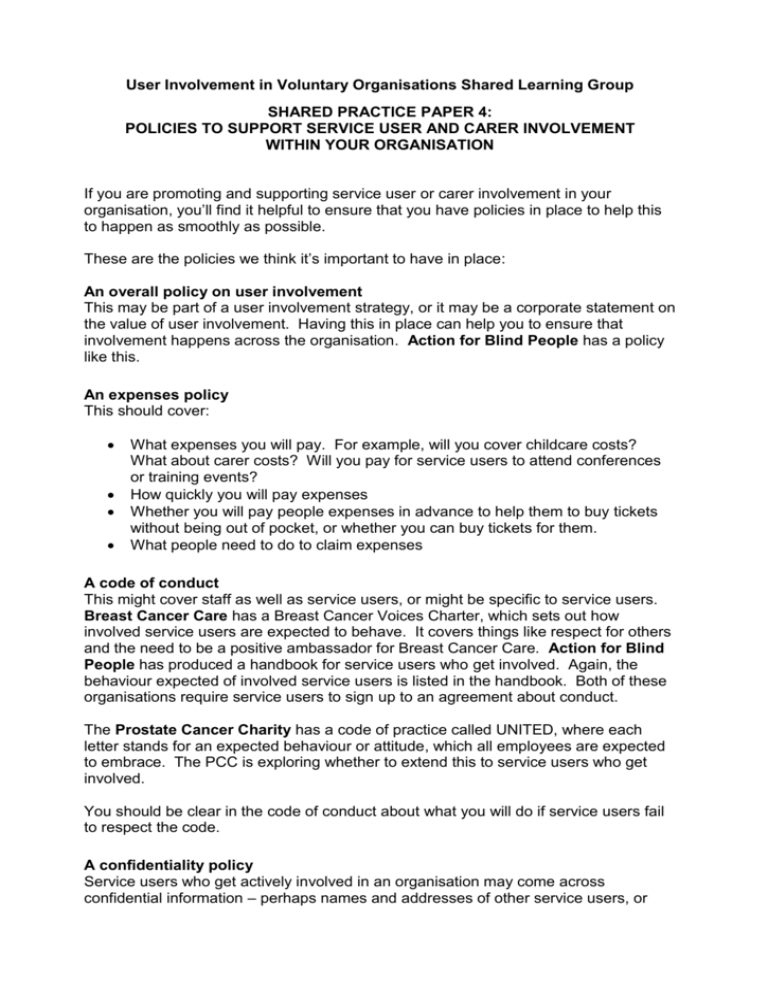Shared practice - policies to support involvement 29-8
advertisement

User Involvement in Voluntary Organisations Shared Learning Group SHARED PRACTICE PAPER 4: POLICIES TO SUPPORT SERVICE USER AND CARER INVOLVEMENT WITHIN YOUR ORGANISATION If you are promoting and supporting service user or carer involvement in your organisation, you’ll find it helpful to ensure that you have policies in place to help this to happen as smoothly as possible. These are the policies we think it’s important to have in place: An overall policy on user involvement This may be part of a user involvement strategy, or it may be a corporate statement on the value of user involvement. Having this in place can help you to ensure that involvement happens across the organisation. Action for Blind People has a policy like this. An expenses policy This should cover: What expenses you will pay. For example, will you cover childcare costs? What about carer costs? Will you pay for service users to attend conferences or training events? How quickly you will pay expenses Whether you will pay people expenses in advance to help them to buy tickets without being out of pocket, or whether you can buy tickets for them. What people need to do to claim expenses A code of conduct This might cover staff as well as service users, or might be specific to service users. Breast Cancer Care has a Breast Cancer Voices Charter, which sets out how involved service users are expected to behave. It covers things like respect for others and the need to be a positive ambassador for Breast Cancer Care. Action for Blind People has produced a handbook for service users who get involved. Again, the behaviour expected of involved service users is listed in the handbook. Both of these organisations require service users to sign up to an agreement about conduct. The Prostate Cancer Charity has a code of practice called UNITED, where each letter stands for an expected behaviour or attitude, which all employees are expected to embrace. The PCC is exploring whether to extend this to service users who get involved. You should be clear in the code of conduct about what you will do if service users fail to respect the code. A confidentiality policy Service users who get actively involved in an organisation may come across confidential information – perhaps names and addresses of other service users, or delicate financial information. It’s therefore important that service users are clear about confidentiality requirements. For example, if you ask a service user to review an application for research funding, can she or he share it with other service users to get a wider range of views? Service users should know what confidentiality requirements there are if they are given contact details by other service users. And they should know that your organisation will keep information about them confidential, too. A complaints policy and procedure Service users need to be clear about how they can raise a concern or complaint. You’ll probably find that your organisation has a complaints policy. If this is the case, ensure it’s applicable to service users, and ensure that service users are aware of it. An insurance policy You need to check that the insurance your organisation holds covers the activities of involved service users – and what it covers. Equality and diversity policy and strategy Your organisation is very likely to have an equality and diversity policy and strategy. This policy will hopefully cover issues around respect of people's differences, inclusive and diverse participatory styles, concepts and choices, and equality of opportunity to be able to participate in decisions that shape people's quality of life. An equality and diversity policy can help you to ensure diverse participation in service user involvement. So it’s helpful to have a look at this policy and to think about how it will impact on your work to involve service users. You may want to think about developing a policy (or familiarising your self with an existing policy) on translation and interpreting. This will enable you to involve service users who do not have English as a first language. Shelter is currently exploring this. You may also want to develop a monitoring policy to ensure that you monitor the range of users who are involved. Need more information? If you are a member of the Shared Learning Group, you’ll find examples of some of these policies in the password protected section of the Group’s website – www.userinvolvement.org.uk. If you are not a member of the Shared Learning Group, please use the ‘contact us’ form on our website and we’ll see what we can do to address any queries you may have. User Involvement in Voluntary Organisations Shared Learning Group September 2008











